Will the Greens want to stay in government with the SNP?
- Published
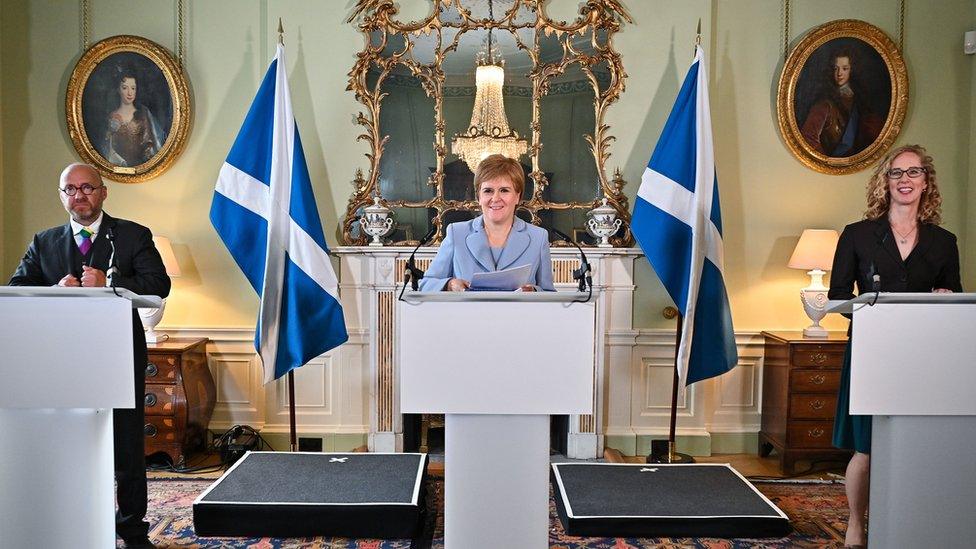
The Scottish Greens are holding their party conference amid speculation over whether their power sharing agreement at Holyrood will survive after the SNP leadership contest.
Green co-leaders Patrick Harvie and Lorna Slater hold ministerial posts in the Scottish government under an agreement they struck with the SNP after the last election.
But their views on several key issues - not least gender self-identification - clearly clash with two of the candidates in the race to succeed Nicola Sturgeon as Scotland's next first minister.
So with the winner of that contest to be announced on Monday, how might the relationship between the two pro-independence parties change?
What's the deal?
The Greens and the SNP signed the Bute House Agreement in 2021, which was hailed by Nicola Sturgeon as a "new and better way of doing government".
The first minister had already declared a climate emergency and was gearing up for the COP26 conference in Glasgow, so the pact was the green cherry on her environmentalist cake.
It installed the two Green co-leaders as junior ministers. Patrick Harvie became minister for zero carbon buildings, active travel and tenants' rights, while Lorna Slater - who had only been elected to Holyrood a few months earlier - became minister for green skills, circular economy and biodiversity.
In return, Ms Sturgeon's government had the security of a majority in parliament for budgets and a bulwark against any votes of no confidence.
The deal did allow for some policy differences on topics like international relations and the economy - from the role of freeports to the use of GDP growth as a yardstick.
But practical disagreements have been rare, particularly because the party's most prominent representatives disappeared into St Andrew's House to learn the ropes of government.
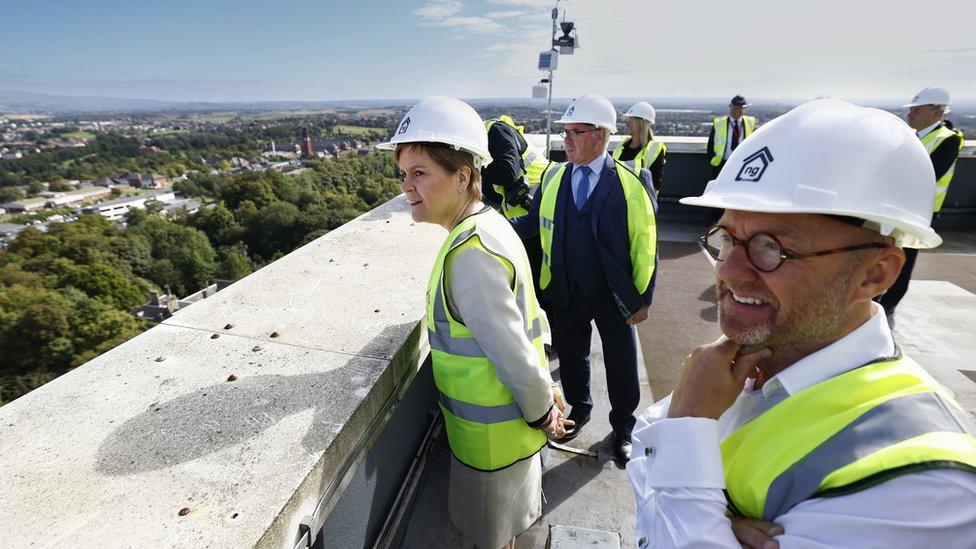
What have the candidates said?
Humza Yousaf has been clear that he would continue the partnership arrangement - as befits his position as the candidate offering the most continuity from Nicola Sturgeon's regime.
However both of the other candidates have said they could seek to review or even scrap the pact.
Ash Regan has claimed the SNP is being "held hostage" by the Greens, warning about the "tail wagging the dog" on social policy - in particular the gender reforms which saw her quit the government.
And Kate Forbes has said "there would need to be a conversation" with the Greens about whether they could back her economic plans.
She said she was willing to work with the party, but said her drive to put economic prosperity "front and centre" was "non-negotiable".
The Greens say economic policy should be based on quality of life and wellbeing rather than "prioritising growth at all costs".
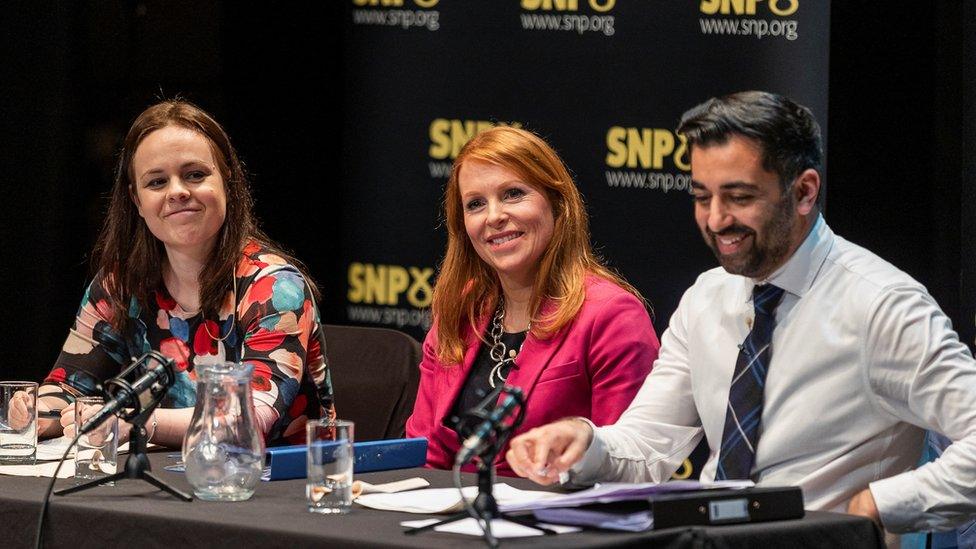
Who would the Greens back?
The Greens have made a token effort to stay out of the contest, declining to openly endorse any of the candidates.
But the statements they have made and the red lines they have drawn over policy suggest only Mr Yousaf could actually keep them in government.
The party hit out at Kate Forbes after she said she would not have voted for equal marriage, with Mr Harvie calling her comments "very shocking" and "outwith the realms of what's acceptable in modern politics".
They have also said gender reform legislation is "baked in" to the Bute House agreement, and that any candidate must "robustly challenge" the UK government's move to block it.
Ms Forbes has said she would not have voted for the Gender Recognition Reform Bill, and has suggested she may not go to court to defend it.
Ms Regan has gone further, saying she would scrap the legislation altogether.
Mr Harvie has also plunged into a row with the ex-minister on Twitter after she said she had spoken to all of the pro-independence parties - something he called "simply, plainly false".
Allow X content?
This article contains content provided by X. We ask for your permission before anything is loaded, as they may be using cookies and other technologies. You may want to read X’s cookie policy, external and privacy policy, external before accepting. To view this content choose ‘accept and continue’.
This preference is important because the Greens get a vote for who becomes first minister - as do all MSPs.
The co-leaders have suggested they could not vote for a candidate who does not share their "progressive" values.
That might just mean abstaining in the Holyrood votes, should Ms Forbes or Ms Regan fail to win their support.
But if there was only one candidate on the day, they could in theory force a tie by voting against the new SNP leader in concert with the Conservatives, Labour and Lib Dems.
Even the prospect of that gives them leverage, should they be looking to extract some extra value from the incoming first minister.
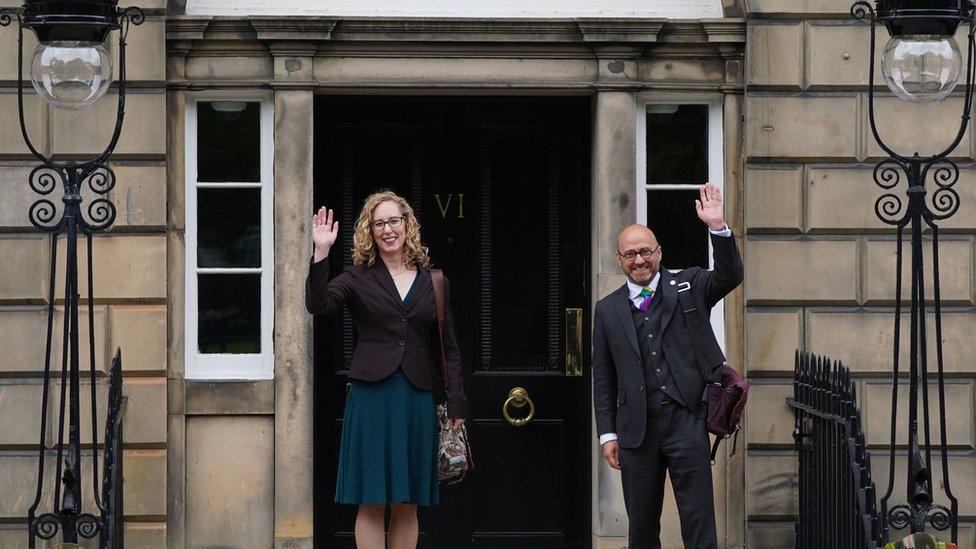
What's in it for them?
The Greens have had a fairly mixed experience in government so far.
The party has been keen to point to wins where they can - like increased investment in free bus travel for young people, or the government's backing for Gillian Mackay's abortion clinic buffer zones bill.
But equally the two Green ministers have been handed some pretty tough issues to front up, most notably the troubled deposit return scheme.
And they have had to give up a significant platform by entering government, with no leaders spot at FMQs and fewer debate slots at Holyrood.
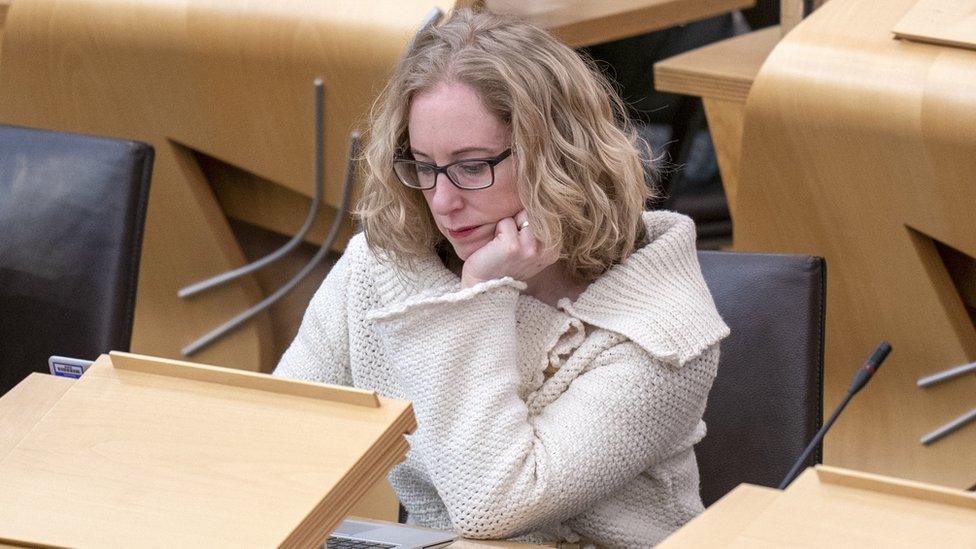
Lorna Slater has landed one of the toughest jobs in government trying to deliver the deposit return scheme
The question over the deal was always whether it delivered more benefits than the party could eke out by holding a minority SNP administration over a barrel in budget talks each year.
That now moves on a bit, to a question of whether they can extract more from the current situation.
One candidate has promised SNP members that he will continue the partnership, while the other two may rely on them for votes to become first minister.
The Greens could potentially push for further carve-outs in the arrangement, and greater priority for their own policies.
They may even just want a little more visibility, thinking back to how Ms Sturgeon tended to dominate the limelight on big policies, including at COP26.
Both sides may say they are keen for the pact to continue - but there is plenty of space for politics behind the scenes in terms of what really happens.